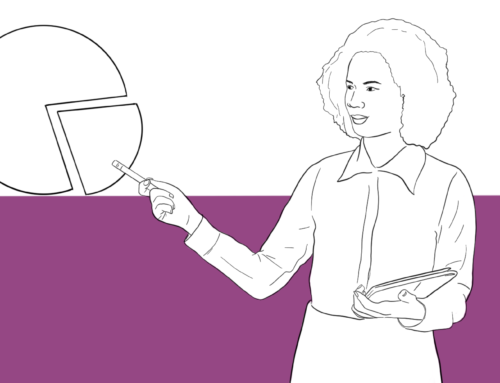As the population in sub-Saharan Africa grows rapidly, so does the need to improve and scale up the delivery of basic services, especially to emerging urban sprawls. By 2050, Africa’s urban population will represent 55 percent of the continent’s total population. Many cities are confronting growing problems of pollution, traffic congestion, poverty as well as poor education and health provisions in our urban communities.

Source: kbia.org
But what exactly is BIG DATA?
Big data has been characterized as the collection, analysis, and use of data characterized by the five Vs: volume, velocity, variety, veracity, and value (of data). Every second of every day, massive amounts of data are generated, especially through human-centered service systems such as government, healthcare, education, retail, finance, etc. Big data also exists in the form of mobile phone data, satellite imagery or aerial imagery data, social media data, radio data, credit card data, smart meter electricity data (Yaka in Uganda) or solar home system data, road sensor data, public transport usage data, health records data and web scraping data. In short, big data refers to extremely large data sets that can be mined to reveal patterns and trends, especially relating to human behavior and interactions.
At the end of the day, this treasure trove of vital information will go to waste if all this data ends up stored on servers, serving no purpose. Data in its raw form has no value. This big data needs to be processed in order to be valuable.
What sets big data apart, is the fact that traditional data-processing application software is inadequate to deal with the volume and structure (or lack of) of the data. Companies using big data must often use complex analytics involving artificial intelligence and machine learning. For example, powerful computers must be able to use image recognition or natural language processing, for example, to identify patterns and trends in the data.
What does BIG DATA have to do with service delivery?
The Internet has democratized data, steadily increasing the amount of information available, both in structured and unstructured formats. Furthermore, with the explosive growth of mobile penetration, social media usage, and electronic transactions, new methods have been developed for collecting or acquiring, integrating, processing, analyzing, understanding, and visualizing data to provide information, and in turn, support integrated and timely decision-making.
SENTIMENT ANALYSIS
In Africa, several foreign companies are at the forefront of harnessing the potential of big data. In Uganda, the Pulse Lab Kampala has developed a technology prototype that allows the analysis of public discourse on radio, similar to social media analyses. The data scientists at Pulse Lab used artificial intelligence and machine learning to develop a digital application called the Radio Content Analysis Tool. The tool transforms discussions taking place on the radio into big data text, which is then mined for topics of interest relevant to the Sustainable Development Goals (SDGs).
The technology provides a flow of real-time information that development and humanitarian agencies can use to understand what people think and how they feel, and to channel the country’s collective intelligence to gain insights and solve problems.

Source: Newz.ug
WASTE MANAGEMENT
In Kenya, IBM Research is driving innovation through a number of commercially viable solutions. IBM identified that waste management is one such sector that could be revolutionized through analytics and the implementation of big data practices. The county government data for Nairobi shows that over five million people live in Nairobi currently, necessitating the need for a garbage collection program that costs an estimated Sh1 billion per month. Additionally, it is estimated that the traffic congestion in Nairobi results in daily losses of US$500,000 due to lost productivity, fuel consumption, accidents, and fatalities.
By installing tracking devices on vehicles in the waste management fleet, analytics-based indicators and alerts were used to develop an efficient system involving vehicle maintenance, truck tracking, real-time information on storage depots and facilities, optimized routes, etc., ensuring that more areas were receiving the necessary services and reducing inefficiencies due to theft, fraud, and mismanagement. Even traffic delays due to potholes and speed bumps could be measured to obtain real-time data on route obstructions!
RENEWABLE ENERGY
Another case study is M-Kopa, a solar home system company based on mobile money payments across East Africa. The company records over one million devices reading each and every day, from the payment interactions to the batteries, the temperature of the devices, and sensors. They also record geographical data on the device locations and up to 450,000 rooftop sunshine readings per day. This information is used to refine their technology, improve their customer service, increase efficiency within their organization, and strategically scale-up throughout the region.
How can we actually pull it off?
Take for example the health sector in Uganda. The Ministry of Health has made significant strides in implementing Electronic Health Record Systems. This data can be further optimized to centralize patient information which when de-identified, aggregated, and analyzed can provide valuable information on the health outcomes across the country. Clinical data from both government and private labs, radiology, and electronic medical records as well as patient data, historical background information, and social factors can be used to enhance predictive accuracy that will improve treatments, strengthen disease surveillance, and enable faster control of outbreaks.
Challenges in urban planning can be solved by big data by helping cities understand traffic patterns. Many of us have had the unpleasant opportunity to experience the “JAM” in Kampala. Big data can be used to develop a traffic data platform that can use GPS tracking to collect traffic flow data, conduct comparative analyses, monitor the effectiveness of flow strategies and craft heat maps that spotlight problem area so as to enforce policies and practices that ease congestion throughout the city.

Source: PCTech Mag
In terms of agriculture and food production, Africa is severely underproducing given the amount of arable land due to climate change, poor practices, wastage, etc. Big data can be used to better inform farmers’ decisions on managing their land and increasing their crop yields. For example, M-Farm currently uses big data to provide information on weather and crop prices by using novel sources of information such as the Famine Early Warning System dataset on agroclimatology provided by the National Aeronautics and Space Administration (NASA), National Oceanic and Atmospheric Administration (NOAA), US Department of Agriculture (USDA), and US Geological Survey (USGS).
But What’s Holding us Back?
Even with this rich resource called ‘big data’ that is collected by private companies, development partners, and government agencies such as the Uganda Bureau of Statistics (UBOS) here in Uganda, what’s holding us back from putting all this data to use to better service delivery across the country?
Almost every year, UBOS through the Community Information System empowers communities to collect, manage and use data for planning and monitoring purposes, including publishing some of this sub-district data on their website. Furthermore, the Ministry of Finance has a dedicated budget website that is used to share disaggregated data; not only financial data but also district-level work plans and performance reports. The Ministry of Health also collects and stores timely data from clinics and hospitals.
It is indeed undebatable that the wealth of data Uganda has is abundant however, the data revolution has failed to be fully affected. Despite these advances, access to the data remains a major challenge.
In 2015, Bill Anderson, a Data and Information Architect published a report titled ‘Joined-Up Data Uganda’ on Development Initiatives stating that; “The vast majority of data that is accessible is only available in pdf format. UNEB sells its data at exorbitant rates (to obtain the complete dataset of 2014 PLE results would cost UGX22 million; that is US$7,000).

Innovations surrounding the use of big data to improve service delivery have been hindered because policymakers and legislators are slow to adopt open government and adopt open data principles. Civil society is no better when it comes to sharing datasets given the competition for donor money and resources. We must all push for more collaboration, more sharing, and more exchange within the private sector, civil society, and government. Technology is one piece of the puzzle, acquiring and accessing the data is the other.
Now, what do we need to do make open data the new norm across Africa?
Written by Pius Enywaru, Communication Lead, and Neema Iyer, Founder at Pollicy





Leave A Comment